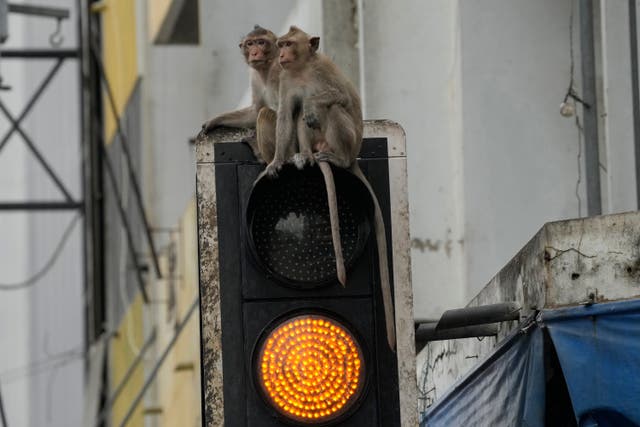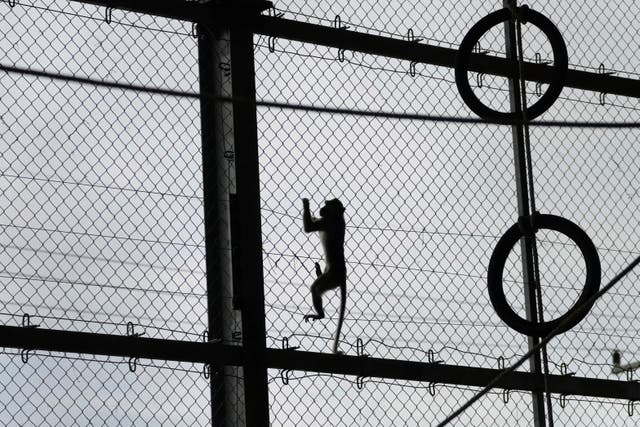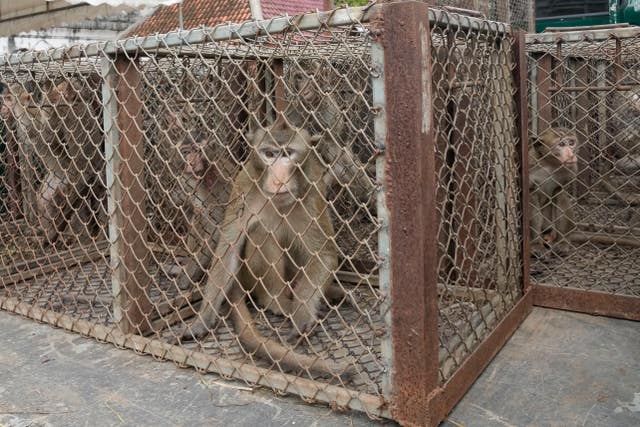
A Thai town run ragged by its ever-growing population of wild monkeys has launched an offensive against the simian raiders using trickery and ripe tropical fruit.
Several high-profile cases of monkey-human conflict recently convinced authorities in Lopburi in central Thailand that they have to reduce the animals’ numbers.
If all goes well, most will end up behind bars, before starting a new life elsewhere.
The first stage of the plan, instituted on Friday, is to bait cages with the animals’ favourite food, then wait for hunger to get the better of their natural caution.

There was early success for the catchers on one street, with three of the macaques falling for the ruse and ending up trapped because they had fancied a taste of rambutan fruit.
The cages had been placed on the street earlier in the week so the monkeys got used to them and found them less threatening.
There are thought to be around 2,500 monkeys running around the town. The capture of the unlucky trio and around 30 others – trapped in other parts of the town – slightly pared down that total.
The effort will go on for five days this month, then is likely to be repeated. Some of the monkeys will be left free to maintain Lopburi’s image as Thailand’s monkey town.
But no-one is expecting the mission to be easy.

Patarapol Maneeorn from Thailand’s Department of National Parks, Wildlife and Plant Conservation, said: “With the monkeys’ intelligence, if some of them go into the cage and are caught, the others outside won’t enter the cage to get the food because they’ve already learnt what’s happened to their friends.”
The roaming monkeys have long been a symbol of the town, 90 miles north of Bangkok, and are a major tourist draw. They have become increasingly aggressive, however, with several videos of them snatching food from residents and causing injuries being widely shared online.
One car parts shop now trades from behind wire. The owners erected it at the time of the coronavirus pandemic, but keeping out the light-fingered primates was also a prime concern. They say they have adapted to the monkey problem, but not everyone has.
“When there are a lot of monkeys around, customers are afraid of buying the goods at the shop. Only our regulars aren’t frightened,” said Supaporn Tantiwong.

The town’s mayor, Chamroen Salacheep, agrees that the monkeys, while bringing in visitors, have also become bad for trade, with shops and malls seeing a drop in income and even people’s homes damaged. Lopburi, he said, is almost an “abandoned town”.
“After our operation is over,” Mr Chamroen said, “I will do a big cleaning across the town and paint all the buildings to regain the faith of the people.”
These may seem like grim times for monkeys in Lopburi, but there is a plan to give them a fresh start.
On Friday authorities began sedating them to carry out health checks before cleaning and sterilizing them and inking them with tattoos so they can be identified to keep accurate records.
After that they will transfer them to a series of huge holding pens, just outside the town centre, while looking for a permanent home.


Comments: Our rules
We want our comments to be a lively and valuable part of our community - a place where readers can debate and engage with the most important local issues. The ability to comment on our stories is a privilege, not a right, however, and that privilege may be withdrawn if it is abused or misused.
Please report any comments that break our rules.
Read the rules here